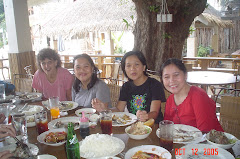Tuesday, December 16, 2008
Training with Adoption Workers
Yesterday was supposed to be a lull day but it was actually a challenging day for me because an international adoption organization requested us to train them on GS. There were seven men and nineteen women. I talked about sexuality, reproductive health and RA 9262. First, I introduced a game that sent us all into thrill of excitement and laughter. I let them group themselves into the kind of relationship they are into at present and answer the question: "Are you happy or not?" "Why or why not". So four groups emerged. Some admitted being single parents, unmarried. The all men group were all married. The biggest number were the married women. The last group were the "searchers" or the singles. The tittilating part was their answer to the next question. The all men group said: "masaya pa naman" (still happy). The married women seemed to be the happiest because of their big belly laughters. But at the end of their report they posed a bit, saying, "hindi naman kasi kayo ang pinipilit" (you (pointing to the men) were not being coerced). The single parents derived their happiness from their children. The searchers pointed to the group of married women and said "gusto naming maging ganyan" (in the future, they wanted to be like them). Wow! that goes the reality of women's lives: violence, hardships, pleasures and all...from there my discussions took me to sexuality, RH and VAWC...how I wish I could this kind of discussions over and over again...perhaps, in the future the "searchers" can have other choices (hehehe)...
Analysing Cases Using CEDAW
We had a three-day workshop at Golden Prince Hotel in Cebu last week. This was the second time we studied CEDAW but it was only now that I realized how difficult it was for me to analyze a case using CEDAW framework. I had to review the different types of state obligations, the core content of the different elements of right (e.g. right to health (availability, quality, etc), what rights were violated and what are the mechanisms available for redress (legal and metalegal). No wonder I got perfect in the quiz because I have to remember all of those things before I can rewrite my initial version of the draft case. But I highly appreciate it that I learned this framework especially when we analyzed the case of a regional hospital which denied access for health service for a prostituted woman. I was also touched when a participant revealed that she had experienced the same (her daughter was denied access that led to the untimely death of her daughter). She narrated it in a very controlled manner but I can sensed how she loved her daughter and the crushing pain that her daughter's life ended that way. That pain was relieved when we had a night of Thai massage at a nearby spa (at P200). I hope next year, the office can possibly apply the same rigor with our VAWc cases.
Subscribe to:
Comments (Atom)




